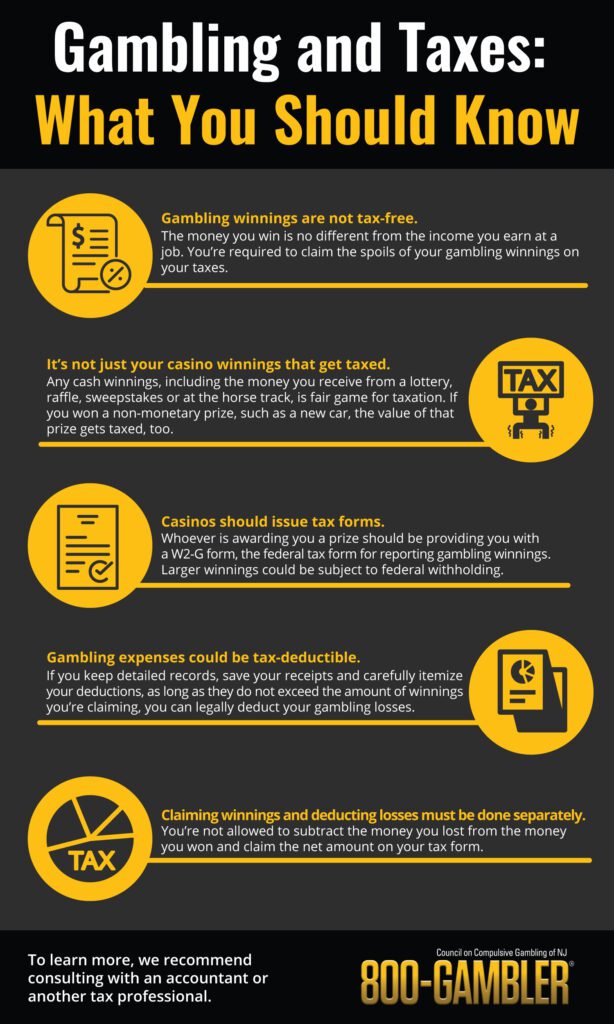
The glittering lights and ringing bells of the casino. The dream of winning the lottery. Gambling can be a lot of fun for most people, and when your number finally comes up -- well, isn't that the whole point?
The Form W-2G issuer sends a copy of your W-2G to the IRS to report your winnings. See IRS Tax Topic No. 154 Form W-2 and Form 1099-R (What to Do if Incorrect or Not Received) for more information.Say 'Thanks' by clicking the thumb icon in a post.Mark the post that answers your question by clicking on 'Mark as Best Answer'. A payer may also send you a Form W-2G if it withholds part of your winnings for federal income tax purposes. You will find the amount of withholding in box 4 on the form. Example: If you win a non-state lottery prize of $10,000, the payer could withhold 25% upfront to pay the IRS in the event you fail to report the winnings at tax time.
The IRS also requires other gambling winnings to be reported on a W-2G if the prize money is subject to tax withholding. Keep in mind, however, that just because your gambling winnings are reported on a W-2G doesn't automatically require the withholding of income taxes; reporting and withholding are two separate requirements. File Form W-2G, Certain Gambling Winnings, to report gambling winnings and any federal income tax withheld on those winnings. The requirements for reporting and withholding depend on the type of gambling, the amount of the gambling winnings, and generally the ratio of the winnings to the wager. File Form W-2G with the IRS.
Of course, we all want to go home big winners with a wad of cash in our pockets. However, once you win, the IRS does, too. In fact, they expect and require you to report your gambling winnings. Gambling winnings (which the IRS refers to as 'income') can include:

Advertisement

Advertisement
- Lotteries
- Raffles
- Horse/dog races
- Noncash prizes -- like cars, trips or houses

What you need to report depends on how much you win, what type of gambling you were doing, and the ratio of your winnings to your wager.
Typically, you'll receive paperwork from the casino (or other source of your payout) to complete if you win a certain amount. You must provide your Social Security number and fill out IRS Form W-2G. This form is called 'Certain Gambling Winnings,' and allows you to report your winnings as income to Uncle Sam. You'll receive that paperwork if you win:
- $600 or more from the state lottery, horse or dog races, jai alai or other wagering (but only if the winnings are 300 times the original wager)
- $1,200 or more at a slot machine or bingo
- $1,500 or more on keno (minus the amount you spent on tickets for the winning game)
- $5,000 or more in poker tournaments
Typically in a winner situation of $5,000 or more (no matter what the game), the payee will not only require you to fill out the above-mentioned forms, but will also take 25 percent of your winnings up front to give directly to Uncle Sam [source: Bell]. If you refuse to fill out the form or provide your Social Security number, most establishments will take 28 percent of your winnings, in accordance with federal law [source: IRS].
You don't have to fill out the W2-G form for winnings on table games, including craps, blackjack, pai gow, baccarat and roulette. However, you still have to report those winnings when you file your regular income tax in April. On form 1040, on the 'Other Income' line (line 21) you report any other winnings, like prize or award money.
Here's where things can get a little more complicated. Just as you report your winnings to the IRS, you can also report your losses. On line 28 of form 1040, 'Other Miscellaneous Deductions,' if you have any gambling losses, note them there. However, your losses can't exceed your winnings. It's also important to note that you'll only want to do this if you're already itemizing your deductions and will end up deducting more than the standard [source: IRS]
All of this information illustrates why it's crucial to keep detailed records of your gambling -- both wins and losses -- especially if you do it often . Signing up for a player's card at a casino is a great idea, because the casino keeps an electronic record for you to easily access [source: Taxpertise].

The takeaway here is that the IRS treats any gambling or contest winnings as income. You should report all of it, even if the casino or other payee doesn't hand you a tax form to fill out. State tax laws apply too so be sure to check with your state's department of revenue to determine your liability [source: Ritchie].
Advertisement
Related Articles
Sources
- Bell, Kay. 'Reporting gambling winnings.' Bankrate. Feb. 3, 2014. (Sept. 22, 2014) http://www.bankrate.com/finance/money-guides/reporting-gambling-winnings.aspx
- IRS. 'Gambling Winnings Are Always Taxable Income.' Aug. 19, 2014. (Sept. 22, 2014) http://www.irs.gov/uac/Gambling-Winnings-Are-Always-Taxable-Income
- IRS. 'Instructions for Forms W-2G and 5754.' 2014. (Sept. 22, 2014) http://www.irs.gov/pub/irs-pdf/iw2g.pdf
- Ritchie, Josh. 'How Are Gambling Winnings Taxed?' TurboTax Blog. March 30, 2012. (Sept. 22, 2014) http://blog.turbotax.intuit.com/2012/03/30/how-are-gambling-winnings-taxed/
- Roche, Yolanda S., E.A. and Roche, Roger C., E.A. 'The Taxman Cometh.' Las Vegas Review-Journal. 2014. (Sept. 22, 2014) http://www.reviewjournal.com/business/casinos-gaming/features/taxlaws.html
- Taxpertise. 'Uncle Sam Wants His Cut on Your Gambling Winnings.' FOXBusiness. Sept. 20, 2013. (Oct. 30, 2014) http://www.foxbusiness.com/personal-finance/2013/09/19/uncle-sam-wants-his-cut-on-your-gambling-winnings/
The glittering lights and ringing bells of the casino. The dream of winning the lottery. Gambling can be a lot of fun for most people, and when your number finally comes up -- well, isn't that the whole point?
Of course, we all want to go home big winners with a wad of cash in our pockets. However, once you win, the IRS does, too. In fact, they expect and require you to report your gambling winnings. Gambling winnings (which the IRS refers to as 'income') can include:
Advertisement
Advertisement
- Lotteries
- Raffles
- Horse/dog races
- Noncash prizes -- like cars, trips or houses
What you need to report depends on how much you win, what type of gambling you were doing, and the ratio of your winnings to your wager.
Typically, you'll receive paperwork from the casino (or other source of your payout) to complete if you win a certain amount. You must provide your Social Security number and fill out IRS Form W-2G. This form is called 'Certain Gambling Winnings,' and allows you to report your winnings as income to Uncle Sam. You'll receive that paperwork if you win:
- $600 or more from the state lottery, horse or dog races, jai alai or other wagering (but only if the winnings are 300 times the original wager)
- $1,200 or more at a slot machine or bingo
- $1,500 or more on keno (minus the amount you spent on tickets for the winning game)
- $5,000 or more in poker tournaments
Typically in a winner situation of $5,000 or more (no matter what the game), the payee will not only require you to fill out the above-mentioned forms, but will also take 25 percent of your winnings up front to give directly to Uncle Sam [source: Bell]. If you refuse to fill out the form or provide your Social Security number, most establishments will take 28 percent of your winnings, in accordance with federal law [source: IRS].
You don't have to fill out the W2-G form for winnings on table games, including craps, blackjack, pai gow, baccarat and roulette. However, you still have to report those winnings when you file your regular income tax in April. On form 1040, on the 'Other Income' line (line 21) you report any other winnings, like prize or award money.
Here's where things can get a little more complicated. Just as you report your winnings to the IRS, you can also report your losses. On line 28 of form 1040, 'Other Miscellaneous Deductions,' if you have any gambling losses, note them there. However, your losses can't exceed your winnings. It's also important to note that you'll only want to do this if you're already itemizing your deductions and will end up deducting more than the standard [source: IRS]
All of this information illustrates why it's crucial to keep detailed records of your gambling -- both wins and losses -- especially if you do it often . Signing up for a player's card at a casino is a great idea, because the casino keeps an electronic record for you to easily access [source: Taxpertise].
Casino Winning Tax Form
The takeaway here is that the IRS treats any gambling or contest winnings as income. You should report all of it, even if the casino or other payee doesn't hand you a tax form to fill out. State tax laws apply too so be sure to check with your state's department of revenue to determine your liability [source: Ritchie].
Advertisement
Casino Winning Tax Form
Related Articles
Gambling Winning Tax Form
Sources
- Bell, Kay. 'Reporting gambling winnings.' Bankrate. Feb. 3, 2014. (Sept. 22, 2014) http://www.bankrate.com/finance/money-guides/reporting-gambling-winnings.aspx
- IRS. 'Gambling Winnings Are Always Taxable Income.' Aug. 19, 2014. (Sept. 22, 2014) http://www.irs.gov/uac/Gambling-Winnings-Are-Always-Taxable-Income
- IRS. 'Instructions for Forms W-2G and 5754.' 2014. (Sept. 22, 2014) http://www.irs.gov/pub/irs-pdf/iw2g.pdf
- Ritchie, Josh. 'How Are Gambling Winnings Taxed?' TurboTax Blog. March 30, 2012. (Sept. 22, 2014) http://blog.turbotax.intuit.com/2012/03/30/how-are-gambling-winnings-taxed/
- Roche, Yolanda S., E.A. and Roche, Roger C., E.A. 'The Taxman Cometh.' Las Vegas Review-Journal. 2014. (Sept. 22, 2014) http://www.reviewjournal.com/business/casinos-gaming/features/taxlaws.html
- Taxpertise. 'Uncle Sam Wants His Cut on Your Gambling Winnings.' FOXBusiness. Sept. 20, 2013. (Oct. 30, 2014) http://www.foxbusiness.com/personal-finance/2013/09/19/uncle-sam-wants-his-cut-on-your-gambling-winnings/